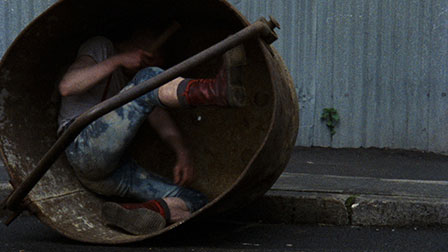Saturday, November 4, 2017
Mike Leigh's view of life on the dole
Mike Leigh made Meantime for BBC's then-new Channel 4 in 1983, and the story goes that it would have vanished without trace had it not been for a few viewers who were impressed enough to tape it from the broadcast and bootleg it among their friends, Now it has found its way to the Criterion Collection, in a print that still suffers a bit from its original 16-millimeter format -- i. e. the picture is a bit less sharp than we've come to expect from movies today -- but if that doesn't worry you, and if you like Mike Leigh's work, then this is well worth a look. Set in the East End of London during the Thatcher years, it offers a painful look at life on the dole. The cast is remarkably strong -- Tim Roth, Gary Oldman, Alfred Molina, Marion Bailey, Phil Daniels, and Pam Ferris all do memorable work -- and the cinematography captures the interiors and exteriors of depressed East London in a way that complements perfectly the states of mind of its denizens.
There is no real back story. We're just faced with the immediate circumstances of the Pollocks -- Mavis and Frank, and their teenage sons Mark (Phil Daniels) and Colin (Tim Roth) -- in their poky flat, with its dodgy windows and sub-standard washing machine. No one in the family works -- the men live on government handouts, even though it soon becomes clear that Mark, at least, is sharp and capable. The parents are feckless, beaten down, and Colin is "slow," in vivid contrast to his brother. Tim Roth's unshowy representation of Colin is painful and gripping. A late scene in which Mavis (Pam Ferris) berates Colin for failing to take up an offer of work that her suburban sister Barbara (Marion Bailey) has made is as painful and true as anything I've seen in movies -- if one were to walk in on a situation like that in "real life" (and it's a very plausible scenario), one would be embarrassed and pained. And yet, that scene and its aftermath help us understand something about Mark that we hadn't been sure about up to that point -- and maybe Mark hadn't been sure about either -- and something about the monosyllabic Colin too, at the very end. For all that, these are characters literally with nowhere to go. Mark talks of "getting away," but there's clearly no away to get to.
It seems that Mavis's sister Barbara has made an escape -- she took a secretarial course in a local college, got a job in a bank, and married "up" -- or at least "up" a bit. Her husband John (Alfred Molina) works in a bank branch too, and they live twelve miles out in the suburbs in a more spacious but far from luxurious house. Their marriage is childless, and there seems to be no deep affection between them. Barbara's offer of a job to Colin -- some interior painting at her house -- could be exploitation (the wages are small) or an act of kindness. Does she know herself? In the middle of the movie, she seems positive, energetic, articulate, and attractive in the scene at Mavis's flat when she makes the job offer. By the end of the movie, she has collapsed in a drunken slump by the time John comes home from work. John seems neither unkind nor abusive, and one wonders if what we see in Barbara is a consequence of her having married to "get away," without particularly thinking of her compatibility or otherwise with the man she has married. Mavis and Frank are trapped, but Barbara, in the suburbs, clearly feels herself in a bind too.
Hovering on the edges of the family story are two East End characters who extend the sense of entrapment beyond what the Pollock family drama shows. These are the skinhead Coxy (Gary Oldman), whom Colin finds impressive, and Hayley (Tilly Vosburgh), a neighborhood girl that Colin fancies and who clearly feels sorry for him without being really interested in him. These two roles are little more than cameos, but the actors make them vivid. Coxy is a mass of anger and a physical impulsiveness that looks like attention-deficit disorder, curiously threatening and yet helpless. Hayley, like the other women in the movie, is depressed, and the camera catches her in scenes in which she seems tightly confined. In the only slightly hokey moment in the film, we see an image of Coxy playing inside an empty oil barrel [see the image above], for all the world looking like a laboratory rat in a wheel in a cage. It's plausible, given what we've seen of Coxy's edgy physicality, but it maybe too obviously points up the central conceit of the movie.
By the end, nothing is solved, but these characters and their circumstances have been made known to us, to the extent that they can be. One might be tempted to complain, as some early viewers apparently were, by the lack of a more explicit political "message" -- Mrs Thatcher is never mentioned, though we do see a view of Whitehall from Trafalgar Square -- but that would add nothing to our engagement with and understanding of the Pollocks and their problems. The film works just fine as it is.
Subscribe to:
Post Comments (Atom)

No comments:
Post a Comment